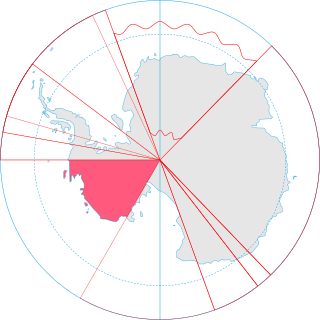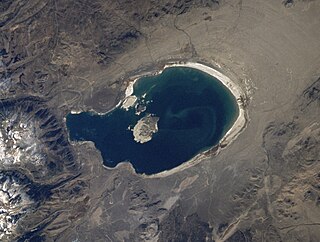
The Antarctic Treaty and related agreements, collectively known as the Antarctic Treaty System (ATS), regulate international relations with respect to Antarctica, Earth's only continent without a native human population. It was the first arms control agreement established during the Cold War, designating the continent as a scientific preserve, establishing freedom of scientific investigation, and banning military activity; for the purposes of the treaty system, Antarctica is defined as all the land and ice shelves south of 60°S latitude. Since September 2004, the Antarctic Treaty Secretariat, which implements the treaty system, is headquartered in Buenos Aires, Argentina.

Environmental laws are laws that protect the environment. Environmental law is the collection of laws, regulations, agreements and common law that governs how humans interact with their environment. This includes environmental regulations; laws governing management of natural resources, such as forests, minerals, or fisheries; and related topics such as environmental impact assessments. Environmental law is seen as the body of laws concerned with the protection of living things from the harm that human activity may immediately or eventually cause to them or their species, either directly or to the media and the habits on which they depend.

The United Nations Convention on the Law of the Sea (UNCLOS), also called the Law of the Sea Convention or the Law of the Sea Treaty, is an international agreement that establishes a legal framework for all marine and maritime activities. As of May 2023, 168 countries and the European Union are parties.

In the field of jurisprudence, equity is the particular body of law, developed in the English Court of Chancery, with the general purpose of providing legal remedies for cases wherein the common law is inflexible and cannot fairly resolve the disputed legal matter. Conceptually, equity was part of the historical origins of the system of common law of England, yet is a field of law separate from common law, because equity has its own unique rules and principles, and was administered by courts of equity.

Terra nullius is a Latin expression meaning "nobody's land". Since the nineteenth century it has occasionally been used in international law as a principle to justify claims that territory may be acquired by a state's occupation of it. There are currently three territories sometimes claimed to be terra nullius: Bir Tawil, four pockets of land near the Danube due to the Croatia–Serbia border dispute, and parts of Antarctica, principally Marie Byrd Land.

The terms international waters or transboundary waters apply where any of the following types of bodies of water transcend international boundaries: oceans, large marine ecosystems, enclosed or semi-enclosed regional seas and estuaries, rivers, lakes, groundwater systems (aquifers), and wetlands.

Space law is the body of law governing space-related activities, encompassing both international and domestic agreements, rules, and principles. Parameters of space law include space exploration, liability for damage, weapons use, rescue efforts, environmental preservation, information sharing, new technologies, and ethics. Other fields of law, such as administrative law, intellectual property law, arms control law, insurance law, environmental law, criminal law, and commercial law, are also integrated within space law.
The Agreement Governing the Activities of States on the Moon and Other Celestial Bodies, better known as the Moon Treaty or Moon Agreement, is a multilateral treaty that turns jurisdiction of all celestial bodies over to the participant countries. Thus, all activities would conform to international law, including the United Nations Charter.
The Australian Department of the Environment was a department of the Government of Australia that existed between September 2013 and July 2016. The department was charged with responsibility for developing and implementing national policy, programs and legislation to protect and conserve Australia's environment and heritage.
Natural heritage refers to the sum total of the elements of biodiversity, including flora and fauna, ecosystems and geological structures. It forms part of our natural resources.

The public trust doctrine is the principle that the sovereign holds in trust for public use some resources such as shoreline between the high and low tide lines, regardless of private property ownership.
Global commons is a term typically used to describe international, supranational, and global resource domains in which common-pool resources are found. Global commons include the earth's shared natural resources, such as the high oceans, the atmosphere and outer space and the Antarctic in particular. Cyberspace may also meet the definition of a global commons.
International law is the set of rules, norms, and standards generally recognized as binding between states. It establishes norms for states across a broad range of domains, including war and diplomacy, economic relations, and human rights. International law differs from state-based domestic legal systems in that it is primarily, though not exclusively, applicable to states, rather than to individuals, and operates largely through consent, since there is no universally accepted authority to enforce it upon sovereign states. States may choose to not abide by international law, and even to breach a treaty but such violations, particularly of peremptory norms, can be met with disapproval by others and in some cases coercive action ranging from diplomatic and economic sanctions to war.

M. C. Mehta v. Kamal Nath was a landmark case in Indian environmental law. In the case, the Supreme Court of India held that the public trust doctrine applied in India.

Antarctica is Earth's southernmost and least-populated continent. Situated almost entirely south of the Antarctic Circle and surrounded by the Southern Ocean, it contains the geographic South Pole. Antarctica is the fifth-largest continent, being about 40% larger than Europe, and has an area of 14,200,000 km2 (5,500,000 sq mi). Most of Antarctica is covered by the Antarctic ice sheet, with an average thickness of 1.9 km (1.2 mi).
Res extra commercium is a doctrine originating in Roman law, holding that certain things may not be the object of private rights, and are therefore insusceptible to being traded. The doctrine encompasses entities such as humans, public areas, organs, citizenship, and prostitution, and is an exception to the general principle of freedom of contract.
Common sense is "knowledge, judgement, and taste which is more or less universal and which is held more or less without reflection or argument". As such, it is often considered to represent the basic level of sound practical judgement or knowledge of basic facts that any adult human being ought to possess. It is "common" in the sense of being shared by nearly all people. The everyday understanding of common sense is ultimately derived from historical philosophical discussions. Relevant terms from other languages used in such discussions include Latin sensus communis, Ancient Greek κοινὴ αἴσθησις, and French bon sens. However, these are not straightforward translations in all contexts, and in English different shades of meaning have developed. In philosophical and scientific contexts, since the Age of Enlightenment the term "common sense" has been used for rhetorical effect both approvingly and disapprovingly. On the one hand it has been a standard for good taste, good sense, and source of scientific and logical axioms. On the other hand it has been equated to conventional wisdom, vulgar prejudice, and superstition.

Common heritage of humanity is a principle of international law that holds the defined territorial areas and elements of humanity's common heritage should be held in trust for future generations and be protected from exploitation by individual nation states or corporations.

Tourism started in Antarctica by the sea in the 1960s. Air overflights started in the 1970s with sightseeing flights by airliners from Australia and New Zealand, and were resumed in the 1990s. The (summer) tour season lasts from November to March. Most of the estimated 14,762 visitors to Antarctica from 1999–2000 were on sea cruises. During the 2009 to 2010 tourist season, over 37,000 people visited Antarctica.

National Audubon Society v. Superior Court was a key case in California highlighting the conflict between the public trust doctrine and appropriative water rights. The Public Trust Doctrine is based on the principle that certain resources are too valuable to be privately owned and must remain available for public use. In National Audubon Society v. Superior Court, the court held that the public trust doctrine restricts the amount of water that can be withdrawn from navigable waterways. The basis for the Public Trust Doctrine goes back to Roman law. Under Roman law, the air, the rivers, the sea and the seashore were incapable of private ownership; they were dedicated to the use of the public. In essence, the public trust doctrine establishes the role of the state as having trustee environmental duties owed to the public that are subsequently enforceable by the public. There is judicial recognition of this, dictating that certain rights of the public are key to individual common law rights. Judicial recognition of the public trust doctrine has been established for tidelands and non-navigable waterways, submerged land and the waters above them, and preservation of a public interest.











